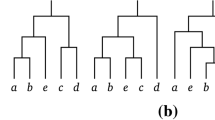Abstract
The “ranked pairs” voting rule introduced in Tideman [2] is independent of clones (not materially affected by the replication of a candidate) in all but a small domain of cases. Appending a particular tie-breaking rule to the ranked pairs rule generates a rule that is completely independent of clones.
Similar content being viewed by others
References
Kemeny JG, Snell JL (1962) Mathematical models in the social sciences. MIT Press, Cambridge
Tideman TN (1987) Independence of clones as a criterion for voting rules. Soc Choice Welfare 4: 185–206
Author information
Authors and Affiliations
Rights and permissions
About this article
Cite this article
Zavist, T.M., Tideman, T.N. Complete independence of clones in the ranked pairs rule. Soc Choice Welfare 6, 167–173 (1989). https://doi.org/10.1007/BF00303170
Received:
Accepted:
Issue Date:
DOI: https://doi.org/10.1007/BF00303170




